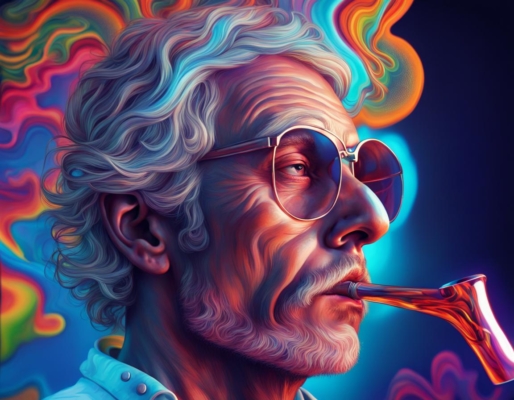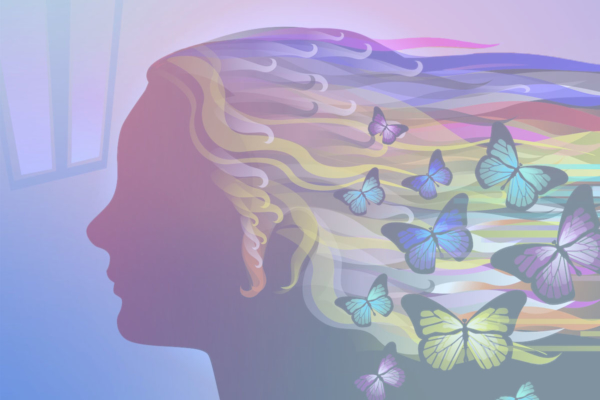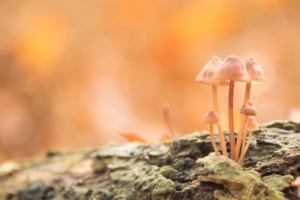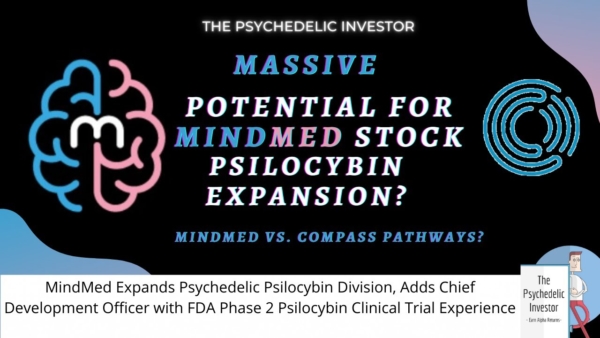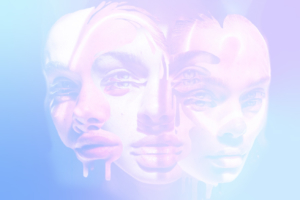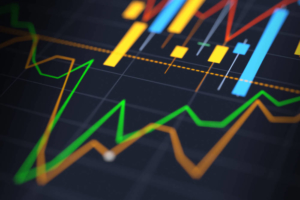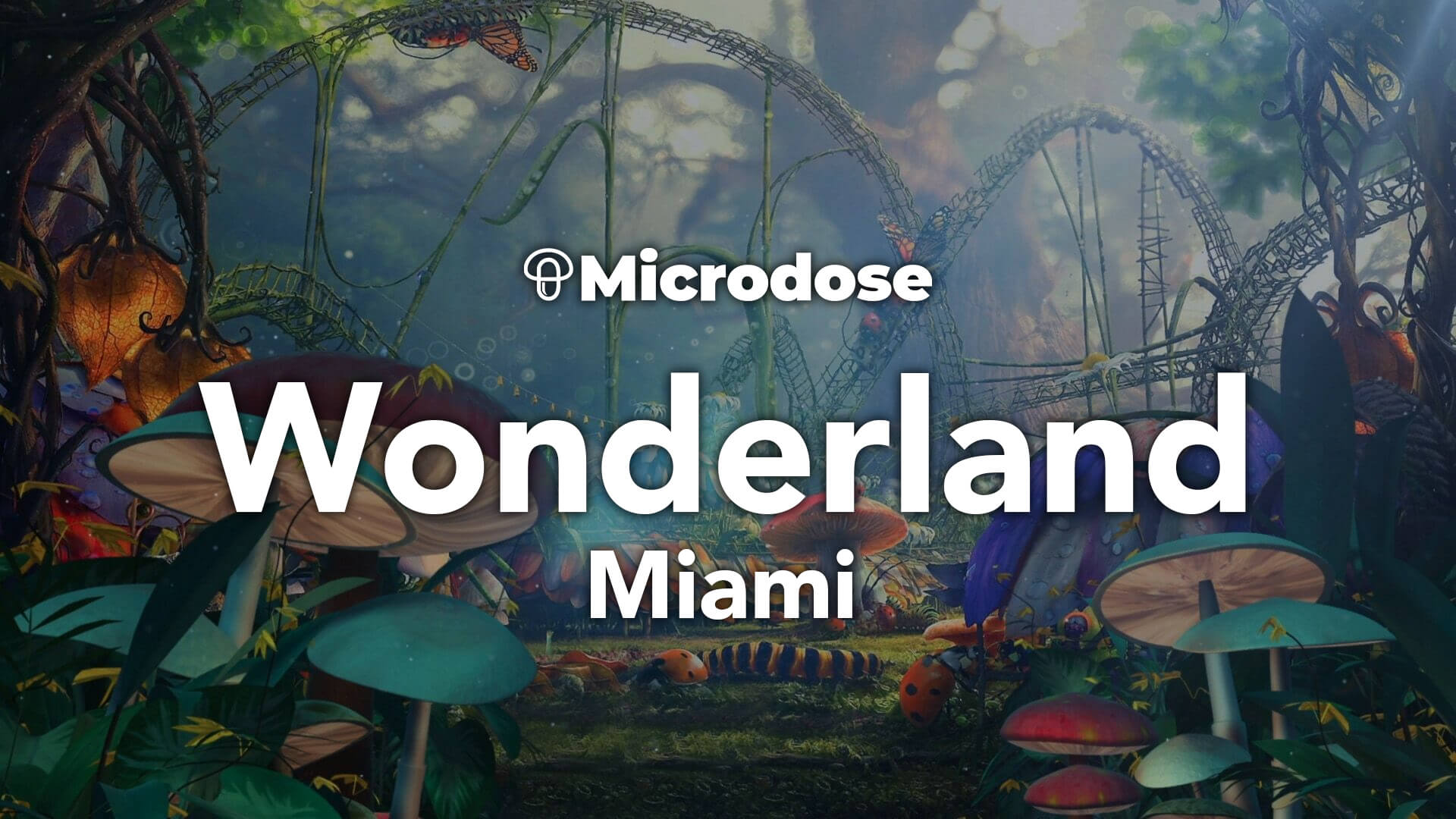
Welcome to Wonderland Miami, a place where all your mushroom and psychedelic networking dreams can come true. Despite running about an hour behind all day, there was exciting programming, countless things to try, functional mushrooms to snack on, and plenty of conversations to be had. Day one of Wonderland Miami focused on the culture of psychedelics, with panels exploring Indigenous cultures, microdosing, sex, art and psychedelics, the future, and more.
Functional Mushrooms and the Gut Brain Axis
Starting off the day with a unique panel at the conference –one geared specifically towards functional mushrooms. A last-minute add-on, “Functional Mushrooms and the Gut Brain Axis” featured speakers Alex Wolfe, the co-founder and COO of Circadian Wellness, Tony Shields, another co-founder/COO of FreshCap Mushrooms, Dean Foor, the founder of Entangled Biome, Dr. Jonathan Fields, the founder of Integrative Medicine and C8 Health, Matthew Cleaver, a consultant at Paradise Labs, and former UFC Hall of Famer and founder of functional mushroom brand Umbo Rashad Evans.
The only panel focused on medicinal and functional mushrooms in a day full of talks on DMT, MDMA, and psilocybin, this panel focused heavily on the connection between one’s brain and one’s gut, and how mental fog and other issues and sensations could be cured and alleviated with the aid of functional mushrooms and other medicinal herbs and plants such as chaga, reishi, turkey tail, and cordyceps, to name a few.
“There’s so much about mushrooms that we don’t know yet,” Matthew Cleaver told the audience. The fungi have so much potential to help us, and so little of it has been fully explored and utilized.
All the men on the panel shared their stories of getting into plant medicine, and how functional mushrooms specifically helped them achieve clarity and peace.
“I felt so disconnected to myself, and I felt disconnected to other people –until I felt a clear connection between my gut and my brain axis.”
For those interested in exploring the benefits of functional mushrooms more, there’s certainly no shortage of them at Wonderland Miami –vendors are peppered all over the venue offerings tasty samples of functional mushroom supplements, mushroom coffee, and more.
Mushroom Coffee
Speaking of mushroom coffee, Eons was offering free samples of their mushroom coffee all day –a pretty super stack containing 10mg of niacin (a Paul Stamets favorite), 100mg of chaga, cordyceps, and lion’s mane each, as well some other substances, and, of course, coffee. The smell? Very earthy and mushroomy. The taste? Much of the same.
The Global Indigenous Communities
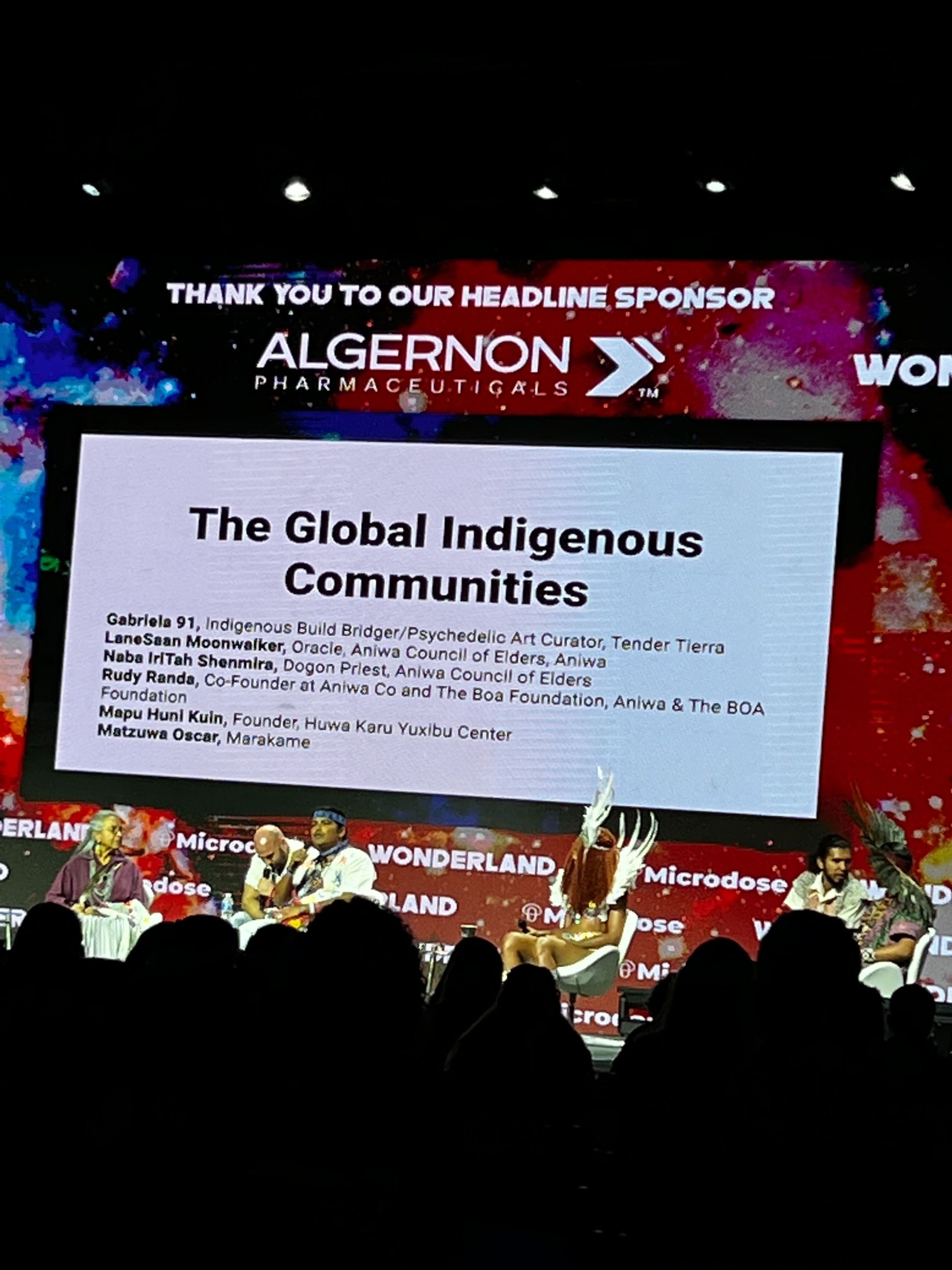
A very important topic in the psychedelic space, Microdose made sure to give a key time frame at the main stage for Indigenous elders and figures to discuss the proper use of plant medicine and offer the Indigenous perspective on its industrialization and commodification.
Featuring speakers Gabriela 91, a Jamaican psychedelic art curator & founder of Tender Tierra organization, Aniwa Council of Elders Dogon Priest Naba IriTah Shenmira, BOA Foundation co-founder Rudy Randa, Aniwa Oracle Grandmother LaneSaan Moonwalker, Marakame Matzuwa Oscar, and Mapu Huni Kuin, the founder of the Huwe Karu Yuxibu Center, the conversation was loud, brave, powerful, and deeply, deeply emotional.
It was crucial to add this programming to Wonderland 2022, as the growing psychedelics industry and space is also becoming more and more commercialized, commodified, and is growing to be very, very white. Many of the panels on the first day featured majority white and male panelists. The Global Indigenous Communities panel allowed Indigenous representatives to speak for themselves, and express the need of the medicine to us without a corporate filter placed over top. The coverage in the media often perpetuates the narrative that the new psychedelics, that this renaissance is for well-funded, walking investment portfolios.
Gabriela 91 shared an eye-opening story of a childhood filled with abuse and trauma, and then her experience in finding ayahuasca and what the medicine taught her. She now works as a psychedelic art curator and gives talks like this, looking for funding for her foundation, Tender Tierra, which helps provide youth in need with the psychedelic medicine they need to connect with themselves, with their communities, and with each other.
She tells listeners that her teachers in Peru and Guatemala cannot afford toilet paper –allowing attendees to put into perspective the glitz and glamour of these conferences, the roots of the medicine from which these ideas are taken, and whether or not these corporations are honoring the medicine enough.
Matzuwa Oscar, partially with the help of a translator, spoke of his connection to plant medicine, specifically to the traditional uses of peyote.
“We have a lot of respect to this plant, and the spirit of the plant,” he said. “They open our mind, and let us connect more deeply with Mother Earth.”
He shares that in his tradition, taking the plant medicine is not as casual as it might be in the west, and spoke on initiations.
“It takes a long time and a lot of commitment to meet the plant and learn,” he said. “It is like when you are making a friend –when you are working with a plant– little by little. Sometimes it takes several years to study it to be able to understand and heal ourselves first.”
His statement, “It’s like university for us,” brings forward the question –are barriers to access to psychedelic medicine too open and loose in the western world? Who gets to use the medicine? Should a more ritualistic, traditional approach be tried? And, ultimately, what do innovators, investors, and investigators in the psychedelic space owe to the Indigenous community for the medicine, and to each other?
Enosis Therapeutics VR
Psychedelic Spotlight had the opportunity for a proper demo session of Enosis Therapeutics’ key VR program, AnchoringVR.
The program, after being developed for three years, allows for open and interactive integration of psychedelic trips and experiences, specifically to be used after dosing sessions in therapy. A user puts on the headset and finds themselves on a cozy, dusky beach with a bonfire on the right. Some stars appear, and the user can take them and speak and record an insight found during the session. The next time, the user can return to this same insight, and add more thoughts, creating a connection. Similarly, something that they want to nurture can be planted, watered with further actions (also spoken and recorded), and grown. On the flipside, burdens that the user might want to get rid of can be turned into stones and symbolically burned in the aforementioned bonfire.
The experience allows for a more tangible integrating experience, and lets a patient see the entire thread of their thoughts. A novel idea with a calm visual presence, it definitely offers something promising to the environment.
Right now, AnchoringVR offers the service via a subscription model to clinics and therapists. Will they ever go direct to consumer, for private trip tracking? While possible, it’s unlikely –the high cost of the VR hardware itself slims the potential market down significantly, keeping Enosis Therapeutics firmly rooted in the B2B side of the business.
Psychedelics and Sobriety
Justice Partners CEO Sylvia Bento and Shell Avenue and Venice CEO & head coach therapist Sean McFarland spoke passionately in this short panel on the relationships between psychedelics and sobriety.
“I know that addiction is a spiritual malady,” McFarland said, explaining his work with high-level clients who appear to have successful lives, but their addiction seems to not “give a fuck.” He discusses his experience working with famed former boxer, recovering addict, and psychedelic advocate Mike Tyson, as well as a more personal story: “The thing I’m most proud of is breaking generational trauma with my son. I was in prison at his age,” he said, tearing up.
Microdosing With Psilocybin Mushrooms: Mushrooms vs. The Molecule
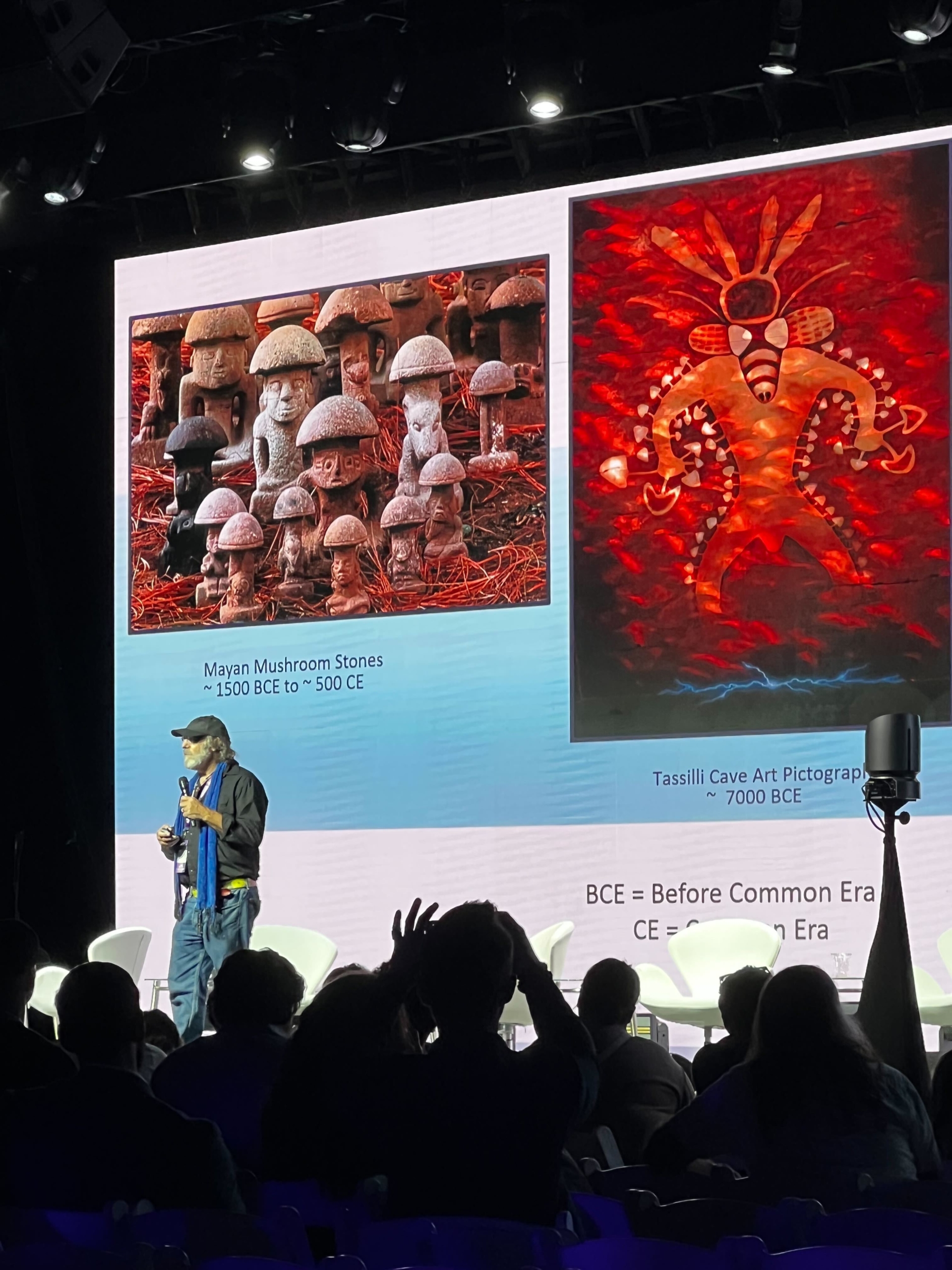
Could a day in Wonderland be complete without a Paul Stamets sighting? The Mushroom Man himself went through a detailed panel outlining the early, sacred history and uses of psilocybin mushrooms, as well as how to microdose and a review of his famous Stamets Stack, which he invented in 2015, and features psilocybin, lion’s mane mushroom, and niacin.
“I love psilocybin mushrooms,” he said. “They’ve been a big part of my life.”
Stamets also revealed his mentors in the fungi space, including Dr. Daniel Stuntz, Catherine “Kit” Scates, Dr. Michael Beug, and Dr. Alexander Smith.
He shared some fascinating headlines, statistics, and articles to a packed room, ending the evening with some bold takeaways.
“Psilocybin makes nicer people. Psilocybin reduces crime.”
He also raised a point to want to reframe the definition of microdosing to be not “subperceptual” but “non-intoxicating,” stating that users who microdose will sense a difference –colors will be brighter, but one won’t be intoxicated.
“I think psilocybin mushrooms have become the zeitgeist of our time,” he said, to much murmuring of appreciation from the room.
Other Highlights
- A giant soundproof Wellness Dome for sound baths, Indigenous healing ceremonies, sacred plant teachings, prayers, and more
- A cryotank for the cold-curious
- A colossal amount of mushroom costumes, including two identical mushroom jumpsuits from two women standing side by side one can only hope are strangers
- Ketamine clinic offerings for after the party
- Liquid IV therapy offerings (for the people who stayed too long at the after party)
- Film screenings in the cinema room
- Book signings and sales, including The Art Of Ecstasy Artbook and Amanda Siebert promoting her new release Psyched: Seven Cutting-Edge Psychedelics Changing The World
